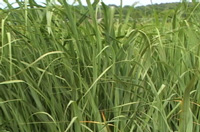The National Corn Growers Association is voicing strong opposition to Texas Governor Rick Perry’s request for a waiver from the Renewable Fuels Standard.
“If granted, the waiver request made by Gov. Perry today will hurt, not help, U.S. consumers by increasing fuel costs and sending a signal to farmers to plant less grain,” said NCGA President Ron Litterer. “A waiver from the RFS would undoubtedly result in higher gasoline prices and it seems very improbable that grain prices or food prices would be reduced.”
 NCGA points to a study released this week by the Center for Agriculture and Rural Development at Iowa State University which found that, “the growth in ethanol production has caused retail gasoline prices to be $0.29 to $0.40 per gallon lower than would otherwise have been the case.”
NCGA points to a study released this week by the Center for Agriculture and Rural Development at Iowa State University which found that, “the growth in ethanol production has caused retail gasoline prices to be $0.29 to $0.40 per gallon lower than would otherwise have been the case.”
Given record global demand for corn, a waiver from the RFS would have little or no effect on grain prices for livestock and poultry feeders, Litterer said. Speculative investment in commodity futures markets, record demand for U.S. grain exports, heightened U.S. and global feed demand, and weaker than expected grain crops in Asia and Australia are among the other factors that must also be considered when looking at current grain prices.


 The
The  White and Cohen were in the position of defending biofuels. Leading in with a story that the Texas governor is calling for waiving half of the Renewable Fuels Standard to help cut food prices, White noted that there have been multiple studies, “including one from the great state of Texas this past month that clearly state that it’s energy prices, in particular petroleum prices, that are driving up food prices – three times as much as anything that commodity prices could do – ethanol just being one of those components of the corn market.”
White and Cohen were in the position of defending biofuels. Leading in with a story that the Texas governor is calling for waiving half of the Renewable Fuels Standard to help cut food prices, White noted that there have been multiple studies, “including one from the great state of Texas this past month that clearly state that it’s energy prices, in particular petroleum prices, that are driving up food prices – three times as much as anything that commodity prices could do – ethanol just being one of those components of the corn market.” The
The  The aim of the workshops is to promote direct marketing relationships between ethanol producers and fuel retailers and reduce costs for all parties involved. Ethanol plants, petroleum equipment suppliers, petroleum marketers and auto dealers are encouraged to attend these free workshops. Presentations will address E85 handling and storage, regulations and safety procedures, applying for the ethanol blender tax credit, and direct marketing of E85 from ethanol plant to retailer.
The aim of the workshops is to promote direct marketing relationships between ethanol producers and fuel retailers and reduce costs for all parties involved. Ethanol plants, petroleum equipment suppliers, petroleum marketers and auto dealers are encouraged to attend these free workshops. Presentations will address E85 handling and storage, regulations and safety procedures, applying for the ethanol blender tax credit, and direct marketing of E85 from ethanol plant to retailer.  As oil prices rise, so does the price of diesel fuel. Truckers, construction companies and municipalities are feeling the pinch of $4-plus-a-gallon diesel fuel, and one town in Alabama has figured out that a less expensive… and greener… solution is biodiesel.
As oil prices rise, so does the price of diesel fuel. Truckers, construction companies and municipalities are feeling the pinch of $4-plus-a-gallon diesel fuel, and one town in Alabama has figured out that a less expensive… and greener… solution is biodiesel. Gas City, Ltd. earned the VE85™ Retailer of the Year Award, VeraSun’s most prestigious award for 2007. The independent petroleum marketer is located in Frankfort, Ill., and owns and operates stations in northeast Illinois, northwest Indiana, Florida and Arizona. Currently, Gas City has 34 fueling locations in Illinois and Indiana offering VE85™. In addition to the Retailer of the Year Award, the company also received the Driving Change Award and the Fueling Growth Award for three of its Illinois VE85™ fueling locations in Schaumberg, Shorewood and Romeoville. Gas City’s Executive Vice President William Shireman was awarded the 2007 Ambassador of the Year Award.
Gas City, Ltd. earned the VE85™ Retailer of the Year Award, VeraSun’s most prestigious award for 2007. The independent petroleum marketer is located in Frankfort, Ill., and owns and operates stations in northeast Illinois, northwest Indiana, Florida and Arizona. Currently, Gas City has 34 fueling locations in Illinois and Indiana offering VE85™. In addition to the Retailer of the Year Award, the company also received the Driving Change Award and the Fueling Growth Award for three of its Illinois VE85™ fueling locations in Schaumberg, Shorewood and Romeoville. Gas City’s Executive Vice President William Shireman was awarded the 2007 Ambassador of the Year Award. The latest “Ethanol Report” podcast from the
The latest “Ethanol Report” podcast from the 
 The
The  A cellulosic biorefinery currently being constructed by
A cellulosic biorefinery currently being constructed by